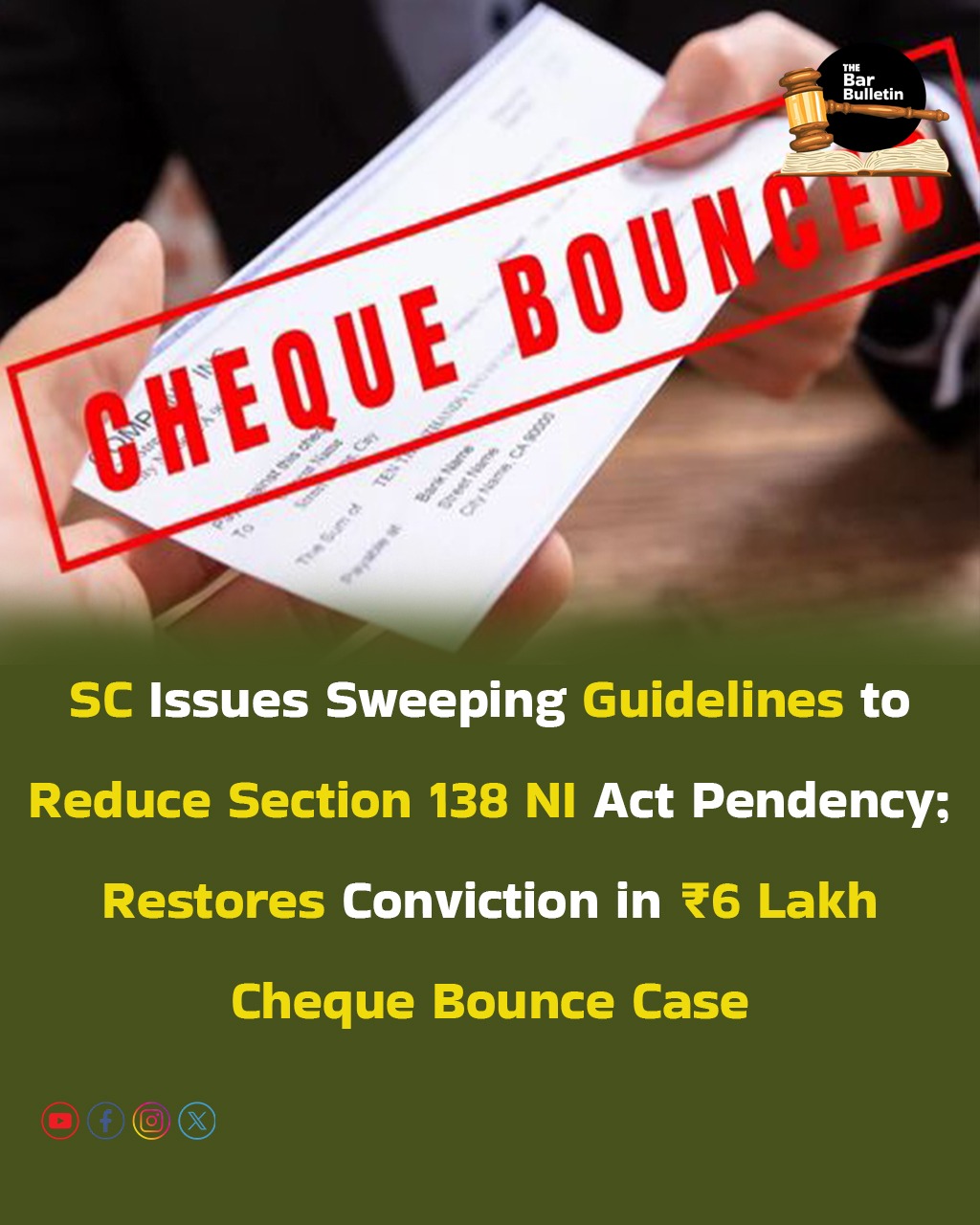In a significant ruling aimed at unclogging trial courts, the Supreme Court on September 25, 2025, set aside a Bombay High Court order acquitting an accused in a ₹6 lakh cheque bounce case and restored the concurrent convictions entered by the trial and sessions courts. The Court directed repayment of ₹7.5 lakh in 15 monthly instalments and simultaneously laid down far-reaching measures to streamline the handling of cheque dishonour matters under Section 138 of the Negotiable Instruments Act, 1881 (NI Act), which constitute a major portion of the criminal docket across the country.
The case arose from a ₹6 lakh cash loan advanced by complainant Sanjabij Tari to his friend Kishore S. Borcar, against which a cheque was issued but dishonoured. Both the trial and sessions courts convicted the accused, holding that the cheque was issued in discharge of a legally enforceable debt. However, in April 2009, the Bombay High Court at Goa acquitted him in revision, primarily doubting the complainant’s financial capacity to advance such a loan.
Allowing the appeal, the Supreme Court reaffirmed that once the execution of a cheque is admitted, presumptions under Sections 118 and 139 NI Act arise that it was issued for consideration and in discharge of a debt. These presumptions, the Court held, can be rebutted only by credible evidence, not mere conjecture. The accused had neither replied to the statutory notice nor produced independent material to support his defence, and the complainant had sufficiently explained the source of funds. The Court also clarified that cash loans above ₹20,000, though attracting penalty under Section 269SS of the Income Tax Act, remain legally enforceable under the NI Act, rejecting the contrary view taken by the Kerala High Court in P.C. Hari v. Shine Varghese, 2025 SCC OnLine Ker 5535. The defence that a blank cheque was given only to secure a bank loan was described as “unbelievable and absurd.”
Taking judicial notice of the staggering pendency of over 6.5 lakh cheque cases in Delhi alone, the Bench framed comprehensive directions effective November 1, 2025, to expedite Section 138 proceedings. Key directions include:
• Multi-mode service of summons, including dasti service and electronic means (email/WhatsApp), with affidavit verification.
• Mandatory affidavit of service by the complainant, with penalties for false statements.
• QR code/UPI payment links to be provided in summons, enabling direct online payment of cheque amounts to facilitate early settlement.
• Every complaint to include a synopsis detailing parties, cheque particulars, cause of action, statutory notice, relief sought, and details of pending cases between the same parties.
• No requirement of pre-cognizance summons under Section 223 of the Bharatiya Nagarik Suraksha Sanhita (BNSS) for NI Act complaints.
• Proceedings to ordinarily remain summary trials, with courts required to record reasons for conversion to summons trials.
• Trial courts to exercise power under Section 143A NI Act for early interim deposit of the cheque amount.
• Post-summons hearings to be held in physical courts to encourage settlement; digital courts may handle pre-summons stages.
• Evening courts may handle cheque cases, but High Courts must fix realistic pecuniary limits.
• Dedicated dashboards in Delhi, Mumbai, and Kolkata to track pendency, monthly disposals, settlement percentages, adjournments, and stage-wise progress, with quarterly reports to the respective High Courts.
• Administrative committees headed by the Chief Justices of the Delhi, Bombay, and Calcutta High Courts to monitor pendency and promote mediation, Lok Adalats, and other ADR mechanisms.
The Court further revisited its guidelines for compounding offences under the NI Act, originally framed in Damodar S. Prabhu vs. vs. Sayed Babalal (2010) 5 SCC 663, to account for the large backlog of cheque-bouncing cases and reduced interest rates. Also, held that if the accused pays the cheque amount before recording of defence evidence, compounding may be allowed without costs. Payment after defence evidence but before judgment attracts 5% of the cheque amount as costs; in Revision or Appeal before the Sessions or High Court, 7.5%; and before the Supreme Court, 10% of the cheque amount.
Appearances
Appellants- Mr. Amarjit Singh Bedi, Adv. Ms. Surekha Raman, Adv. Mr. Shreyash Kumar, Adv. Mr. Harshit Singh, Adv. Mr. Sidharth Nair, Adv. M/S. K J John And Co, AOR
Respondents- Mr. Ankit Yadav, Adv. Mr. T. Mahipal, AOR Ms. Gunjan Rathore, Adv. Ms. Shivangi Gulati, Adv. Mr. Chaitanya Sonkeria, Adv. Ms. Aastha Harshwal, Adv. Mr. Merusagar Samantaray, AOR

